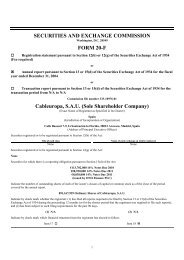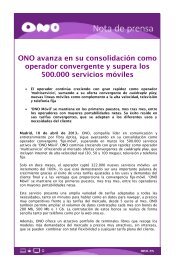Report on ONO Midco, SAU and its subsidiaries as of December 31 ...
Report on ONO Midco, SAU and its subsidiaries as of December 31 ...
Report on ONO Midco, SAU and its subsidiaries as of December 31 ...
Create successful ePaper yourself
Turn your PDF publications into a flip-book with our unique Google optimized e-Paper software.
Telecommunicati<strong>on</strong>s Law, the MIET h<strong>as</strong> certain additi<strong>on</strong>al powers to impose new obligati<strong>on</strong>s to operators to guarantee services<br />
interoperability, to ensure the integrity <strong>of</strong> the networks, to manage the radio spectrum or to guarantee user´s rights. It h<strong>as</strong> to<br />
promoted use <strong>of</strong> st<strong>and</strong>ards <strong>and</strong> technical specificati<strong>on</strong>s <strong>and</strong> it also holds powers <strong>of</strong> inspecti<strong>on</strong> <strong>on</strong> CMT issues.<br />
An additi<strong>on</strong>al independent oversight body, the CMT, w<strong>as</strong> created in 1996. The CMT supervises electr<strong>on</strong>ic<br />
communicati<strong>on</strong>s operators in Spain. Audiovisual communicati<strong>on</strong> services in Spain will be supervised by the new regulator<br />
organism said above whose c<strong>on</strong>stituti<strong>on</strong> is pending. In the meantime the MIET through SETSI is the supervisory authority (for a<br />
further discussi<strong>on</strong> <strong>on</strong> the audiovisual media nati<strong>on</strong>al regulatory authorities, ple<strong>as</strong>e see “—Regulati<strong>on</strong> <strong>of</strong> Audiovisual<br />
Communicati<strong>on</strong> Services” below).<br />
The CMT carries out reviews <strong>of</strong> markets identified by the 2007 Market Recommendati<strong>on</strong> <strong>as</strong> susceptible to ex ante<br />
regulati<strong>on</strong>. The CMT establishes <strong>and</strong> supervises operators, promotes competiti<strong>on</strong> in the electr<strong>on</strong>ic communicati<strong>on</strong>s <strong>and</strong><br />
audiovisual markets, solves c<strong>on</strong>flicts between operators <strong>and</strong> (<strong>as</strong> the c<strong>as</strong>e may be) arbitrates operator disputes at the request <strong>of</strong> the<br />
parties. The CMT h<strong>as</strong> certain additi<strong>on</strong>al powers to safeguard the plurality <strong>of</strong> service <strong>of</strong>ferings <strong>and</strong> to access networks <strong>and</strong> network<br />
interc<strong>on</strong>necti<strong>on</strong>. The CMT also holds powers <strong>of</strong> inspecti<strong>on</strong> <strong>and</strong> sancti<strong>on</strong> in c<strong>on</strong>necti<strong>on</strong> with matters such <strong>as</strong> price policy, specific<br />
market definiti<strong>on</strong>, declarati<strong>on</strong> <strong>of</strong> SMP operators (up<strong>on</strong> whom the CMT is entitled to impose obligati<strong>on</strong>s) <strong>and</strong> merger c<strong>on</strong>trol.<br />
The authorities <strong>of</strong> the relevant aut<strong>on</strong>omous Spanish communities also have certain powers over the audiovisual sector.<br />
General Law <strong>on</strong> Telecommunicati<strong>on</strong>s <strong>of</strong> 2003<br />
The General Law <strong>on</strong> Telecommunicati<strong>on</strong>s establishes the new regulatory framework for electr<strong>on</strong>ic communicati<strong>on</strong>s<br />
services in accordance with applicable EU directives. Except for certain provisi<strong>on</strong>s, this repealed <strong>and</strong> replaced the General Law <strong>on</strong><br />
Telecommunicati<strong>on</strong>s <strong>of</strong> 1998 which liberalized the provisi<strong>on</strong> <strong>of</strong> telecommunicati<strong>on</strong>s services in Spain. It is the primary legislati<strong>on</strong><br />
governing the provisi<strong>on</strong> <strong>of</strong> electr<strong>on</strong>ic communicati<strong>on</strong>s services <strong>and</strong> networks <strong>and</strong> transposes the European RF (see above). The<br />
General Law <strong>on</strong> Telecommunicati<strong>on</strong>s aims, am<strong>on</strong>g other things, to enhance effective competiti<strong>on</strong> in the telecommunicati<strong>on</strong>s<br />
sector, safeguard operator compliance with public service obligati<strong>on</strong>s (especially those related to universal service), promote<br />
development <strong>of</strong> the telecommunicati<strong>on</strong>s sector, ensure an efficient use <strong>of</strong> scarce resources (such <strong>as</strong> numbering <strong>and</strong> radio<br />
spectrum), defend users’ rights <strong>and</strong> c<strong>on</strong>tribute to the development <strong>of</strong> the internal electr<strong>on</strong>ic communicati<strong>on</strong>s market within the<br />
EU. According to the General Law <strong>on</strong> Telecommunicati<strong>on</strong>s, telecommunicati<strong>on</strong>s are c<strong>on</strong>sidered services <strong>of</strong> general interest to be<br />
provided under free competiti<strong>on</strong> regardless <strong>of</strong> the fact that certain public service obligati<strong>on</strong>s are imposed up<strong>on</strong> the operators.<br />
The General Law <strong>on</strong> Telecommunicati<strong>on</strong>s grants universal rights <strong>of</strong> access to b<strong>as</strong>ic services <strong>and</strong> c<strong>on</strong>tains provisi<strong>on</strong>s<br />
with which an individual or legal entity must comply in order to be c<strong>on</strong>sidered an electr<strong>on</strong>ic communicati<strong>on</strong>s operator. It governs<br />
the privacy <strong>of</strong> communicati<strong>on</strong>s, the protecti<strong>on</strong> <strong>of</strong> pers<strong>on</strong>al data, the c<strong>on</strong>figurati<strong>on</strong> <strong>of</strong> networks <strong>and</strong> services, interc<strong>on</strong>necti<strong>on</strong> <strong>and</strong><br />
access, public service obligati<strong>on</strong>s, users’ protecti<strong>on</strong>, market definiti<strong>on</strong>s <strong>and</strong> SMP operators. Additi<strong>on</strong>ally, it provides rules <strong>and</strong><br />
procedures for the certificati<strong>on</strong> <strong>of</strong> devices used for providing telecommunicati<strong>on</strong>s services.<br />
to date:<br />
Its provisi<strong>on</strong>s are implemented through several regulati<strong>on</strong>s. The following are the most important approved regulati<strong>on</strong>s<br />
• Regulati<strong>on</strong> providing the c<strong>on</strong>diti<strong>on</strong>s necessary for electr<strong>on</strong>ic communicati<strong>on</strong>s services, universal service <strong>and</strong><br />
user’s protecti<strong>on</strong> (approved by means <strong>of</strong> Royal Decree 424/2005, <strong>of</strong> April 15, <strong>as</strong> amended) (“Services<br />
Regulati<strong>on</strong>”);<br />
• Regulati<strong>on</strong> providing for c<strong>on</strong>diti<strong>on</strong>s <strong>of</strong> electr<strong>on</strong>ic communicati<strong>on</strong> services (approved by means <strong>of</strong> Ministerial<br />
Order ITC/912/2006, <strong>of</strong> March 29, developing Royal Decree 424/2005);<br />
• User’s rights <strong>and</strong> premium rate service regulati<strong>on</strong> (approved by Ministerial Order PRE 361/2002, <strong>of</strong> October 14,<br />
<strong>as</strong> amended by Ministerial Order PRE 2410/2004, <strong>of</strong> July 20). In May 2009, the Spanish government approved<br />
the user’s Rights Letters through Royal Decree 899/2009, <strong>of</strong> May 22;<br />
• Regulati<strong>on</strong> <strong>of</strong> the electr<strong>on</strong>ic communicati<strong>on</strong>s market, network access <strong>and</strong> numbering (approved by means <strong>of</strong><br />
Royal Decree 2296/2004, <strong>of</strong> <strong>December</strong> 10, <strong>as</strong> amended) (“Markets <strong>and</strong> Access Regulati<strong>on</strong>”); <strong>and</strong><br />
• Regulati<strong>on</strong> <strong>of</strong> the use <strong>of</strong> the radio spectrum (approved by means <strong>of</strong> Royal Decree 863/2008, <strong>of</strong> May 23).<br />
The General Law <strong>on</strong> Telecommunicati<strong>on</strong>s establishes that the CMT will define the relevant markets (following the<br />
European Commissi<strong>on</strong>’s Market Recommendati<strong>on</strong> <strong>and</strong> the Guidelines), determine whether markets are competitive <strong>and</strong>, if they<br />
are deemed not competitive, impose proporti<strong>on</strong>al <strong>and</strong> appropriate obligati<strong>on</strong>s <strong>on</strong> SMP operators.<br />
In order to c<strong>on</strong>form to the provisi<strong>on</strong>s <strong>of</strong> the EU Directives which were revised in <strong>December</strong> 2009 (see—Regulati<strong>on</strong> <strong>of</strong><br />
Audiovisual Communicati<strong>on</strong>s Services—European Uni<strong>on</strong> Overview), the General Law Telecommunicati<strong>on</strong>s h<strong>as</strong> been amended in<br />
March 2012 by the RD 13/2012 whereby the 2009 Directives have been transposed.<br />
45

















